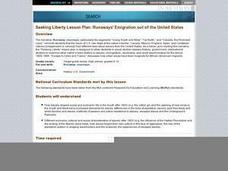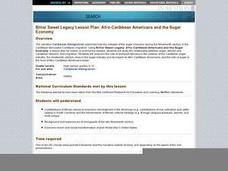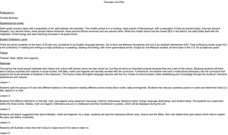Curated OER
Populists and Progressives
Students study the Gilded Age in American History. They present a speech demonstrating knowledge of the platforms of the Progressives and Populists.
Curated OER
Get to Know Your City
Third graders research the history of their home city and how it's development was influenced by different groups of people. They present their research information to the class.
Curated OER
The Fugitive Slave Law and Migration
Students examine the Fugitive Slave Law as a motivating factor for slaves to emigrate outside the United States. After discussing the relationships between fugitive slaves and North American and Caribbean countries, they write essays...
Curated OER
A Bracero Remembers Working Near Chicago
In this primary source analysis worksheet, students analyze an interview with a bracero who describes his memories of working near Chicago. Students respond to 3 short answer questions based on the interview.
Curated OER
A Bracero Compares Expectations versus Reality of Life in the United States
In this primary source analysis worksheet, students analyze an interview with a bracero who describes the expectations and realities of life in the United States. Students respond to 3 short answer questions based on the...
Curated OER
Assembling a Story
Learners observe, discuss, and interpret Radcliffe Bailey's work, By the River. They create personal narratives of people who came to the U.S. during the 18th or 19th century.
Curated OER
The Revolt of Juan "Cheno" Cortina
Tenth graders examine the social and cultural impact of immigrant groups and the oppression of ethnic minorities with a focus on the role of Juan Cortina in Mexico. In small groups they discuss what a revolutionary is, read and discuss...
Curated OER
The Ku Klux Klan In Indiana: 1920-1930
Pupils examine the role of the Ku Klux Klan in Indiana from 1920-1930. They read an informational handout, define key vocabulary terms, conduct an interview with a parent or grandparent, write a family history, and role-play a scenario.
Curated OER
Coming to Terms: Stories of Southeast Asian Political Refugees
Eleventh graders examine the reasons why Southeast Asian refugees left their home for the United States. They conduct interviews and research their suffering and history. They examine primary source documents to better understand their...
Curated OER
Afro-Caribbean Americans and the Sugar Economy
Students read the narrative, Caribbean Immigration and examine how sugar production and migration of people of African origin have been intertwined for centuries. Working in three groups, they present oral reports on the three eras of...
Curated OER
Legends and Myths: Trickster Tales
Students work in groups to research the characteristics of various myths and legends. They read tales, illustrate them, record oral storytelling efforts and write an original folktale. Students then invite parents to a dramatic...
Curated OER
The New England Fishing Industry:Sea Changes in a Community
Explore New England's economic and cultural past and possible issues New Englanders will face in the future. Middle and high schoolers research the fishing industry and the need for regulation. They analyze the topography of New England...
Curated OER
A Treaty Tail: U.S. - Indian Treaty Councils in the Northwest
Students view a painting as a document to find out about the Indian Treaty Councils. In this artist's perspective lesson, students study the conflicts as shown in various pictures. Students answer questions about what they...
Curated OER
Leschi: Justice in Our Time
Young scholars examine the lives of the Nisqually people and the resource consumption philosophy. For this Native American philosophy lesson, students use primary sources to understand the resource consumption philosophy and then...
Curated OER
Putting It All Together: Creating an artifact
Eleventh graders analyze a variety of images and documents, then create artifacts to archive, such as a newspaper, an album, or scrapbook from their writings, drawings, and projects. They present learned information to their peers
Curated OER
Marching to the Beat of a Different Drum
Students explore the American dream. In this contemporary music lesson, students analyze the lyrics of songs by Neil Diamond, Bruce Springsteen, and David Massengill. Students create 3-D representations of the American dream and write...
Curated OER
The Hispanic Migration into Iowa
Sixth graders examine the positive and negative effects of the migration of people of Hispanic descent in the state of Iowa. They examine and interpret census data using maps before comparing the positives and negatives. They read...
Curated OER
What Are We Going To Do About Baby Six Billion?
Students formulate and evaluate suggestions about government policy using demographic examples and projections. They examine websites and utilize worksheets imbedded in this plan.
Curated OER
Thematic Unit: Beginning Holocaust Studies
Fifth graders discuss concepts of diversity, culture, and prejudice, gain understanding of harm caused by prejudice, and demonstrate ability to think critically and a desire to act morally.
Curated OER
Virtual Ellis Island Museum Unit:
Learners conduct secondary source research using the internet and library resources to research the backgrounds of their family's cultural and ethnic heritages.
Curated OER
New Citizen Exam is Democracy 101
Young scholars read a USA Today article about U.S. democracy and then complete questions about the topic. For this democracy lesson, students read the article 'New Citizen Exam is Democracy 101.' Young scholars learn about the test for...
Curated OER
Accordion Book for Comparing Cultures
Fourth graders are introduced to the different cultural groups that have settled in Ohio. In groups, they research and describe the products and cultural practices of each group. Using the information, they create an accordion book for...
Curated OER
Prime Ministers Dinner
Eighth graders pretend as if they are the King or Queen of Canada (England), and they have invited former prime ministers of Canada to dinner.
Curated OER
Bias vs. Perspective: An Inevitable Aspect of Journalism?
Students explore the types of media that U.S. teens prefer the ways in which viewers identify and account for journalistic bias. They explore the ways in which media shapes one's opinion or affects their judgment.

























